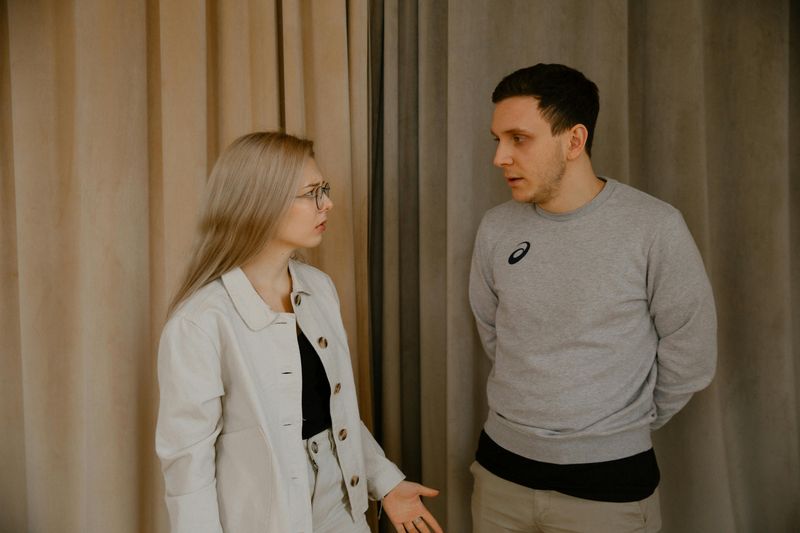Friendships should bring joy, support, and genuine connection to our lives. But sometimes, those closest to us might express their negative feelings indirectly, making it hard to address issues or maintain healthy boundaries. Recognising passive aggressive behaviour in friends isn’t always straightforward, as it often hides behind smiles and seemingly innocent comments. Here’s how to spot those subtle red flags before they damage your relationship beyond repair.
1. The Silent Treatment Master

They’ll suddenly stop responding to messages or give one-word answers when you’ve supposedly done something wrong. No explanation, just icy silence that leaves you scrambling to figure out what crime you’ve committed.
Rather than confronting issues directly, these friends weaponise silence, making you walk on eggshells around them. The cold shoulder might last hours or even weeks, depending on how ‘wronged’ they feel.
What’s particularly maddening is that when questioned, they’ll insist “everything’s fine” with a tight-lipped smile that clearly indicates the opposite.
2. Backhanded Compliment Champion

“Wow, you’re so brave wearing that outfit!” or “You’re actually quite clever when you try” – these friends have mastered the art of disguising insults as praise. The compliment feels off, leaving you with a peculiar sting rather than a warm glow.
Their comments often target your insecurities with surgical precision. They’ll deliver these verbal jabs with a sweet smile, making it difficult to call them out without seeming overly sensitive.
If you express hurt feelings, they’ll quickly gaslight you with “I meant it as a compliment! Why are you so sensitive?”
3. The Perpetual Victim

No matter what happens, they’ve somehow been wronged more than anyone else. These friends transform every situation into evidence of how the world – and especially you – have mistreated them.
Did you reschedule plans? You clearly don’t value their time. Did you succeed at something? They’ll subtly imply you had advantages they never received.
Their victimhood serves as a clever shield against accountability. By positioning themselves as the wounded party, they never have to acknowledge their own hurtful behaviours or apologise for letting you down.
4. Convenient Forgetfulness

“Oh, did I promise to help you move? I completely forgot!” These friends have selective memories that conveniently malfunction whenever they’re meant to fulfil obligations they don’t fancy.
They remember tiny details when it benefits them but develop amnesia about commitments, promises, or things that matter to you. This isn’t genuine forgetfulness – it’s a calculated avoidance strategy.
The pattern becomes clear over time: they remember your birthday when they need something from you, but forget when it’s their turn to show up or reciprocate support.
5. Sarcasm As A Second Language

While good-natured teasing is part of many friendships, these mates use sarcasm as their primary communication tool. Their jokes often have a bitter aftertaste, targeting your vulnerabilities rather than being genuinely playful.
“Just kidding!” becomes their get-out-of-jail-free card when they cross lines. They’ll make cutting remarks about your choices, appearance, or achievements, then dismiss your hurt feelings as you “not getting the joke.”
Pay attention to the frequency – when sarcasm becomes their default setting rather than occasional banter, it’s often masking genuine hostility they’re unwilling to express directly.
6. The Guilt-Trip Expert

Masters of emotional manipulation, these friends make you feel terrible for perfectly reasonable boundaries or decisions. They’ll dramatically sigh, “It’s fine, I’ll just sit at home alone…again” when you can’t meet their often unreasonable expectations.
Their arsenal includes sad-face emojis, pointed references to how others treat them better, and subtle implications that you’re selfish. The underlying message is always crystal clear: your needs matter less than their wants.
Rather than expressing disappointment directly, they wrap it in layers of martyrdom designed to make you question your own judgment and cave to their demands.
7. Deliberately Doing Things Wrong

Asked them to water your plants while you’re away? They’ll either underwater or drown them. This isn’t incompetence – it’s deliberate sabotage disguised as helplessness.
When they don’t want to do something but can’t say no directly, they’ll perform so poorly that you’ll never ask again. The classic “strategic incompetence” might show up when they help with tasks, follow directions, or assist with projects.
Watch for the pattern: they’re mysteriously capable in areas they enjoy but become utterly hopeless when the task doesn’t align with their interests or when they’re feeling resentful.
8. The Information Withholder

“Oh, I thought you already knew about the party” they say, despite never mentioning it. These friends “accidentally” leave you out of plans, forget to share important information, or give you crucial details at the last minute.
Their exclusion tactics are subtle enough to maintain plausible deniability. They’ll claim forgetfulness or miscommunication while systematically keeping you in the dark about matters where you should be informed.
This power play gives them control over your participation in social events or group activities. Pay attention to whether these “oversights” happen randomly or follow patterns of conflict or jealousy.
9. Procrastination As Punishment

Waiting is their weapon of choice. These friends will deliberately delay responses, arrive late, or postpone plans as a way of asserting control and expressing hidden anger.
They might take days to answer simple questions that require immediate attention or consistently show up 30 minutes late when meeting you – but mysteriously manage to be punctual for other people or events they prioritise.
The message behind their tardiness is clear: your time isn’t valuable, and making you wait is their passive way of showing displeasure without having to voice their feelings directly.